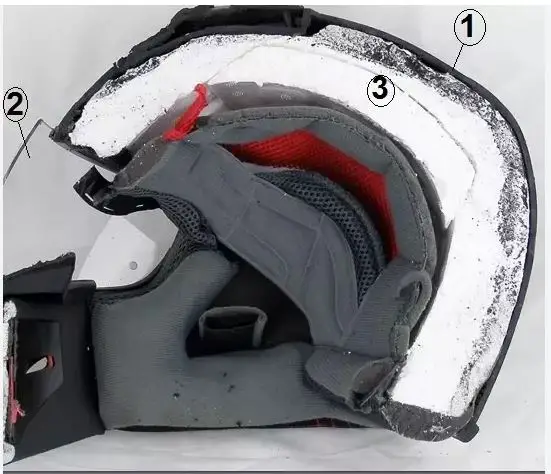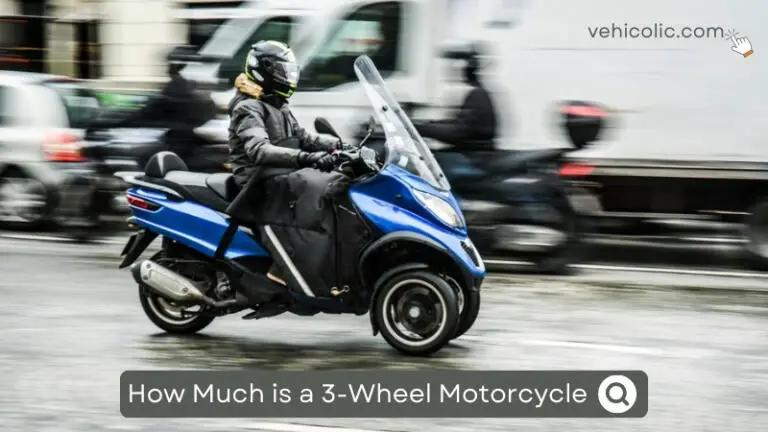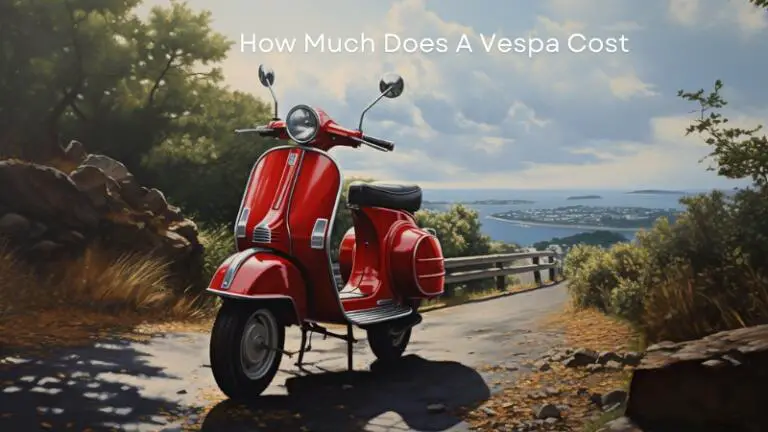How Long Is a Motorcycle Helmet Good For
According to helmet manufacturers, motorcycle helmets should be replaced every five years. This recommendation is especially important for riders who frequently hit the road, as daily use can cause helmets to degrade faster.
However, it’s essential to regularly check your helmet for warning signs that may indicate the need for a replacement. While the five-year rule is a good general guideline, it’s crucial to prioritize safety over the lifespan of your helmet. We will explore the factors that affect a motorcycle helmet’s longevity and provide insight into when it may be time to replace your helmet.
Additionally, we will address common questions surrounding helmet expiration dates and offer tips to ensure that you choose a safe and reliable helmet.

Credit: www.webbikeworld.com
The Lifespan Of A Motorcycle Helmet
The consensus from helmet manufacturers is that the rider should replace their helmets every five years. That may seem like a lot, depending on how often you ride. This rule mostly applies to riders who hit the road every day. Riding for hours on end will only cause your helmet to degrade that much faster.
While the five-year rule serves as a good general guideline for determining the lifespan of a motorcycle helmet, the significance of regular checks for wear and tear should not be underestimated. It is important to inspect your helmet for any signs of damage or deterioration, such as cracks, loose padding, or worn straps.
Additionally, the frequency of your riding can also impact the lifespan of your helmet. If you ride frequently, especially in harsh weather conditions, your helmet may deteriorate more quickly. It is crucial to pay attention to the condition of your helmet and replace it if necessary to ensure your safety on the road.
Warning Signs That You Need A New Motorcycle Helmet
How Long Is a Motorcycle Helmet Good For
Three signs indicating it’s time for a new helmet: Cardo Systems.
The ultimate guide to determining the lifespan of a motorcycle helmet: AGVSPORT.
The consensus from helmet manufacturers is that the rider should replace their helmets every five years. That may seem like a lot, depending on how often you ride. This rule mostly applies to riders that hit the road every day. Riding for hours on end will only cause your helmet to degrade that much faster.
While the five-year rule serves as a good general guideline for determining the lifespan of a motorcycle helmet, the significance of regular checks for maintenance cannot be overlooked. Cardo Systems highlights three warning signs indicating that you need a new motorcycle helmet.
Additionally, AGVSPORT unveils the ultimate guide to determine the lifespan of a motorcycle helmet. It is important to stay informed and prioritize your safety on the road.
Factors Affecting The Longevity Of A Motorcycle Helmet
According to helmet manufacturers, motorcycle helmets should be replaced every five years for optimal safety. However, riders who frequently hit the road may need to replace their helmets sooner due to wear and tear. It’s important to regularly check for signs of degradation to ensure the effectiveness of your helmet.
| The consensus from helmet manufacturers is that the rider should replace their helmets every five years. That may seem like a lot, depending on how often you ride. This rule mostly applies to riders that hit the road every day. Riding for hours on end will only cause your helmet to degrade that much faster. |
| While the five-year rule serves as a good general guideline for determining the lifespan of a motorcycle helmet, regular checks are also significant. Motorcycle safety experts recommend replacing a helmet after five years or as soon as it’s been in a crash. |
| As for an unused motorcycle helmet, it also has a limited lifespan. Even if it has been sitting in a box in a properly aired room for four or five years, it should still perform its intended function. However, it’s important to note that motorcycle helmets do have definite expiration dates and can become less effective in the event of an auto accident. |
Checking For Helmet Expiration And Replacement
The consensus among helmet manufacturers is that motorcycle helmets should be replaced every five years. However, riders who use their helmets frequently may need to replace them sooner due to accelerated wear and tear. Regular checks are crucial for ensuring the helmet’s safety and effectiveness.
| The consensus from helmet manufacturers is that the rider should replace their helmets every five years. That may seem like a lot, depending on how often you ride. This rule mostly applies to riders that hit the road every day. Riding for hours on end will only cause your helmet to degrade that much faster. |
| The industry standard states that the lifespan of a motorcycle helmet is five years. That is as long as you have not cut its life short by an accident. Manufacturers also recommend replacing a helmet after a crash, even if it has not yet reached the five-year mark. |
| When determining if your motorcycle helmet is expired, it is important to regularly check for warning signs. These signs include a deteriorating outer shell, worn or loose straps, and a deteriorating inner liner. If any of these signs are present, it is time to replace your helmet. |
Manufacturers’ Recommendations On Helmet Replacement
The consensus from helmet manufacturers is that the rider should replace their helmets every five years. That may seem like a lot, depending on how often you ride. This rule mostly applies to riders that hit the road every day. Riding for hours on end will only cause your helmet to degrade that much faster. While the five-year rule serves as a good general guideline for determining the lifespan of a motorcycle helmet, the significance of regular checks for potential damage cannot be overlooked. The expanded polystyrene liner (EPS) plays a crucial role in protecting your head during accidents. Over time, it may start to degrade and compromise the helmet’s effectiveness. Additionally, it is important to consider potential damage under the helmet’s paint, which may not be visible to the naked eye. Therefore, it is wise to adhere to the manufacturers’ recommendations and replace your motorcycle helmet every five years, even if there are no external signs of damage or degradation. |
Common Questions About Motorcycle Helmet Lifespan
The consensus from helmet manufacturers is that the rider should replace their helmets every five years. That may seem like a lot, depending on how often you ride. This rule mostly applies to riders that hit the road every day. Riding for hours on end will only cause your helmet to degrade that much faster.
Three Warning Signs You Need a New Motorcycle Helmet – Cardo Systems
How Long Do Motorcycle Helmets Last? Unveiling the Ultimate Guide – AGVSPORT
While the five-year rule serves as a good general guideline for determining the lifespan of a motorcycle helmet, the significance of regular checks for …
How many years does a motorcycle helmet last? – Quora
The motorcycle safety folks recommend replacing a helmet after five years, or as soon as it’s been in a crash. I’ve been riding for nine years and I’m on my …
The industry standard states that the lifespan of a motorcycle helmet is five years. That is as long as you have not cut its life short by an …
When should I replace my motorcycle helmet? – Motolegends
And whilst these outcomes are possible, a helmet that has sat in a box in a properly aired room for four or five years should still perform its …
How to Check If Your Motorcycle Helmet is Expired | The Drive
The Average Expiration Date of a Motorcycle Helmet … It’s between five and seven years, which gives you a lot of use. And for comparison’s sake, …
When Was the Last Time You Replaced Your Bike Helmet?
Do motorcycle helmets have an expiration date? Yes, motorcycle helmets do have definite expiration dates and could become less effective in the event of an auto accident. Ask yourself these questions to determine whether or not it’s time for a replacement.
Motorcycle Helmets Have an Expiration Date – St. Louis, MO
Manufacturers will also say that helmets need to be replaced after five to seven years due to the expanded polystyrene liner (EPS) – as well as the outer shell – potentially starting to degrade. It’s under the paint that damage could happen, but you’ll not be able to see it.
Does dropping a motorcycle helmet ruin it? – Bennetts Insurance
Did you know that even best of the best helmets have an “expiration date”? Most high end helmets are good for about five years past the date of manufacture.
Motorcycle Helmets – how old is too old? – Beach Moto
FAQs Of How Long Is A Motorcycle Helmet Good For
Is A 20 Year Old Helmet Still Good?
The consensus among helmet manufacturers is that helmets should be replaced every five years. Regular checks are important for determining the lifespan of a helmet, and it may need to be replaced sooner if it has been in a crash.
Remember that the lifespan of a helmet can be shortened if it has been stored improperly or exposed to damage.
Do Motorcycle Helmets Have An Expiration Date?
Yes, motorcycle helmets do have expiration dates. The general consensus among manufacturers is that helmets should be replaced every five years. Frequent riding can cause the helmet to degrade faster. It is also recommended to replace the helmet after a crash or if it has been dropped.
How Often Should I Replace Motorcycle Helmet?
According to helmet manufacturers, motorcycle helmets should be replaced every five years. This applies especially to riders who frequently hit the road. Riding regularly can cause the helmet to degrade faster. It is also recommended to replace a helmet if it has been in a crash.
Do Helmets Expire After 5 Years?
Yes, helmets expire after 5 years, according to helmet manufacturers. Regular use and long riding hours can accelerate helmet degradation. It is recommended to check for warning signs and replace a helmet after 5 years or if it has been in a crash.
Conclusion
The consensus among helmet manufacturers is that motorcycle helmets should be replaced every five years. While this may seem like a long time, it’s important to note that regular riding can cause your helmet to degrade faster.
Additionally, it’s recommended to replace your helmet after a crash, as it may no longer provide adequate protection.
By following these guidelines and regularly checking your helmet for any signs of wear and tear, you can ensure your safety on the road.







